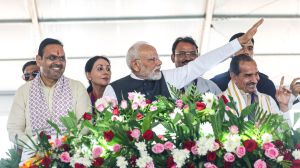After Bhillai, Durgapur joins suspect list
After faulty tracks, defective coaches, inattentive drivers, it’s now inferior quality wheels which have been blamed for causing railwa...

After faulty tracks, defective coaches, inattentive drivers, it’s now inferior quality wheels which have been blamed for causing railway accidents.
At least 11 recent accidents — including the derailment of Bangalore-bound train near Mysore last week that killed four — have been caused due to cracks in the wheels. Confirming this, Railway Minister Nitish Kumar said it were the wheels manufactured at Durgapur Steel Plant which were found to be faulty, prone to fractures.
The minister has also directed general managers of all zones to discard the wheels manufactured at Durgapur through periodic overhaul for better safety. The hydrogen content in the steel used to manufacture wheels was more than the permissible safety limit. ‘‘This introduces air bubbles in the wheel, making it brittle and prone to fractures,’’ explained an official.
Durgapur Steel Plant supplied one-fourth of wheels to the Railways and the remaining were manufactured at Rail-Wheel factory at Yellahanka near Bangalore. ‘‘It was only one particular lot of wheels which developed problems. The new ones coming out from there are better,’’ the official said, adding that there was no cause for panic.
However, Nitish said there is an urgent need to improve supervision at the Durgapur plant to ensure a strict quality control. ‘‘After the Bhillai Steel Plant, it is now the turn of Durgapur to improve their standards to be at par with international standards. We are taking up the issue with them,’’ he added.
Earlier, it was the rails manufactured at the Bhillai plant which had a similar problem — of high hydrogen content. The 1998 Khanna train accident had been blamed on fractures in the rail manufactured at Bhillai.
Inaugurating the conference of general managers, Nitish told them that it is their responsibility to ensure quality control of all material, including rails, wheels and coaches.
Referring to the blast on the track, causing derailment of Shalimar Express in Jammu, the Railway Minister said the GMs should remain in close touch with the Chief Secretaries of states and share intelligence and information for better security.




- 01
- 02
- 03
- 04
- 05


























